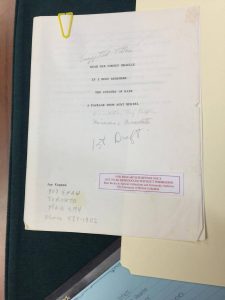Dearest Readers!
The day has come. As we enter the last week of classes, our first year is irreversibly coming to an end. How strange it feels. As I reflect back on the year that has passed a wave of relieved uneasiness wash over me. As a First Year International UBC student, the past months have both academically and in general offered me entirely new experiences. When I first arrived at UBC in August, I had everything planned out in my head. I had done my research and I (thought) knew exactly which experiences UBC had to offer that I wanted to seek out. In the end, I did some of the ones I had planned for, yet, so many others. Unexpected ones. These experiences have pushed, stretched, pulled and bent me simultaneously in countless directions. I am tired. Quite frankly I am exhausted and relieved that I soon will be going home. Yet, I am not done.
In the past week of my ASTU course, we have examined the US intervention in Iraq through the lens of American military literature. In particular, we focused on the author and former US Marine Phil Klay’s work “Redeployed”. “Redeployed” is a collection of short stories and we focused on one of them with the same title as the whole collection. In “Redeployment”, Klay tells the story of an American soldier who is returning home after having served the US military overseas. This story depicts the complex sensation of isolation, despair, and regret that can accompany a soldier when returning home. As we have discussed in class, Klay skilfully portrays the soldier’s sensation of detachment and restlessness. For example, Klay illustrates the scene of the “homecoming” as deeply stressful and absurd for the protagonist by emphasizing the soldier’s awkward reunion with his wife. There is no doubt that Klay writes, as he also has emphasized in an essay for the New York Times, in the genre of American war literature and soldier’s experiences of contemporary war. Yet, I would argue that this story does touch upon the universal theme of how difficult it can be to speak about experiences that have been so detached from the life of the people.
Reading this story, I found myself surprised as I recognized some aspects of feeling uneasy about returning home. Professor Luger mentioned in class about soldiers being “redeployed” both refers to go away for service and to go back home and going home often only is a stage of transition. Soldiers experience the homecoming repeatedly, knowing that they soon will be leaving again. Similarly, I have had my own homecomings. Having studied abroad for the past four years, going home has now become a temporary place of transition. Just as Klay depicts the soldier struggling with disconnect between what he thinks that he should feel and what he is actually feeling, I too have experienced a similar sensation when coming home. The construction of “home” having to be connected to a certain set of sensations, such as happiness or comfort, can, in reality, be highly problematic. I know, that when I return home this summer I will not immediately be experiencing these feelings. Most likely I will experience quite the opposite feelings in fact. And that is okay. What I have learned during these four years is that by speaking about how my life away from home has impacted and changed me, I am able to mend the crack between the person I was when I left and the person I am coming back. Thus, just as Klay urges us to break down the preconceived ideas of war being “unimaginable” and “unspeakable” and allow for soldiers to speak up, I want to urge all international students to do the same when returning home.
All the best 🙂



